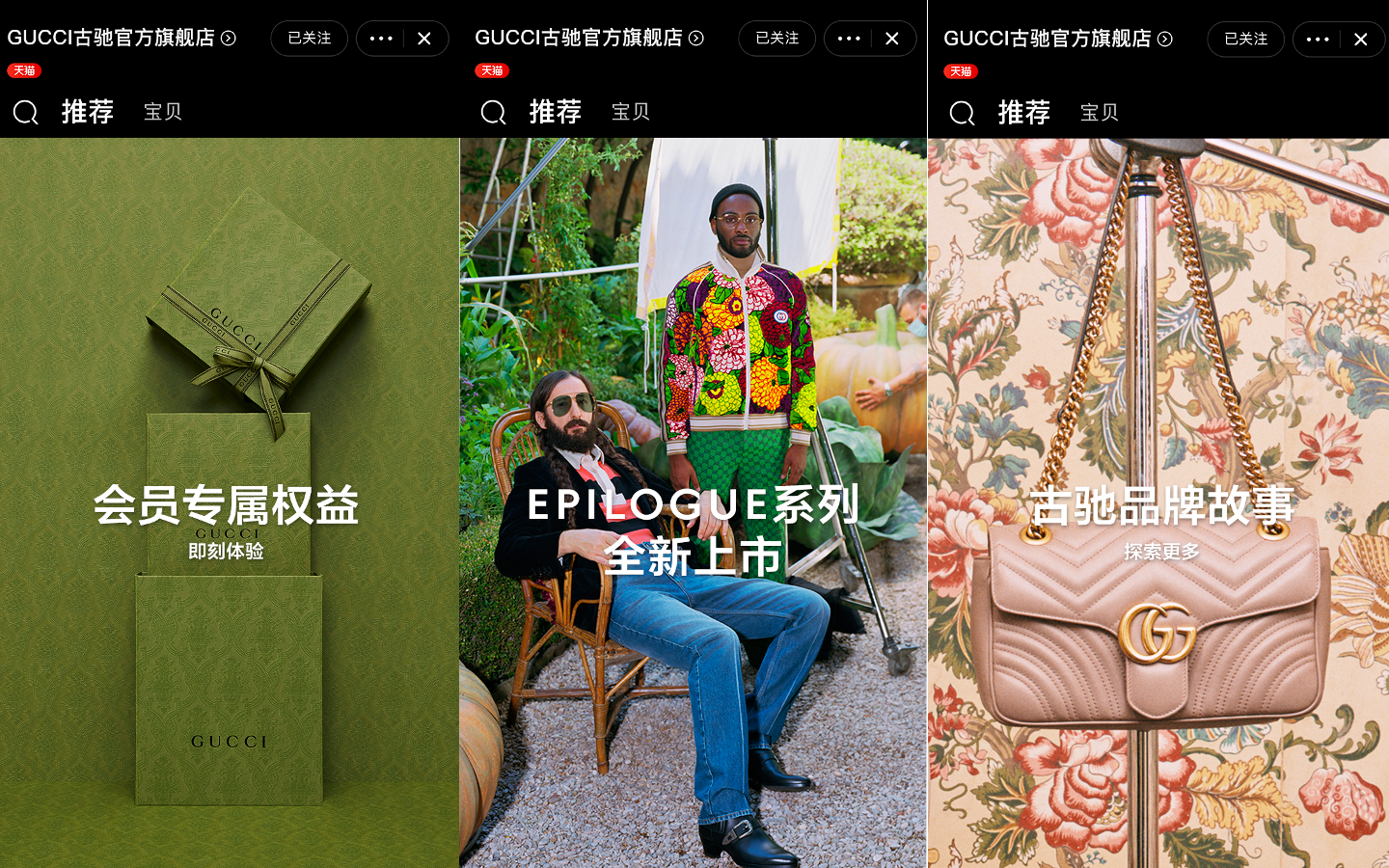
The pandemic has sent shockwaves across the global luxury landscape, but for many brands, 2020 also ushered in rapid transformation and growth.
Nowhere has that been more evident than on Alibaba’s Tmall Luxury Pavilion, which saw an acceleration of brands joining the platform this year, including Cartier, Balenciaga, and now, Gucci.
Gucci on Friday announced plans to launch two flagship stores for its fashion and beauty lines on the Pavilion, Alibaba Group’s dedicated platform for high-end brands, a move that will broaden the Italian fashion house’s customer reach in China.
On Dec. 21, Gucci is opening the first Pavilion store. It will offer its leather goods, ready-to-wear, accessories, watches and jewelry collections, followed by a beauty flagship launching in February next year, operated by its license partner, Coty. The stores will provide more than 750 million Chinese consumers on Alibaba’s retail marketplaces access to Gucci’s full range of fragrances and makeup products.
“Gucci has strategically invested in and cultivated a ‘digital-first’ approach globally, including the establishment of a dedicated Chinese digital ecosystem over the past years,” said Marco Bizzarri, president and CEO of Gucci.
Since launching its Chinese website in 2017, the company has been expanding its presence across local social media platforms such as Weibo and Little Red Book.
“Today’s announcement represents the next step in this strategy as we provide our customers in China with an authorized, customized e-commerce experience on the Tmall Luxury Pavilion in partnership with Alibaba,” said Bizzari.
Michael Evans, president of Alibaba Group, added that Chinese consumers have come to expect elevated, seamless and digitally enabled experiences from brands.
“We look forward to working with the iconic brand Gucci to help them forge even greater success in the Chinese market by meeting the expectations of today’s digitally native luxury consumers,” he said.
Prospects for digitally savvy luxury brands like Gucci are looking rosy, with luxury consumption in China expected to gain 48% to nearly RMB346 billion ($53 billion), by year-end, per a joint report from Tmall Luxury Pavilion and management consultancy Bain & Company released this week. While the global luxury goods market shrank by 23% this year, China almost doubled its market share – and remains on track to overtake Europe and the Americas as the world’s biggest luxury market by 2025.
According to a previous Bain study, China’s luxury online penetration increased to 23% from 12% year over year, as more consumers turned towards digital platforms during the pandemic. Bain predicted e-commerce will be the biggest channel for luxury spending globally by 2025.
The Pavilion recently celebrated its third anniversary, boasting more than 200 luxury and designer brands. Products range from apparel and cosmetics to jewelry, watches and automotives. Cartier, Chloé, Burberry, Bally, Valentino, Balenciaga, Coach, Balmain, Salvatore Ferragamo, Maison Margiela, Jaeger-LeCoultre and IWC Schaffhausen are among brands that have joined the platform.
Last month, Farfetch announced plans to launch luxury shopping channels on Tmall Luxury Pavilion and other e-commerce marketplaces within Alibaba’s ecosystem, including Luxury Soho and Tmall Global. It was part of a landmark deal between the London-based online luxury platform, Alibaba and Richemont to accelerate digital transformation in the luxury industry, as well as to bring “Luxury New Retail” to a new generation of shoppers via seamless integration of digital and physical experiences.
This follows the already-successful integration of Richemont’s Net-a-Porter platform on Tmall Luxury Pavilion last year. The Swiss luxury retailer’s ties with Alibaba date back to 2018, when they first announced a joint venture to bring Richemont’s offerings to Chinese consumers online. The company has since expanded its lineup of brands available on the Pavilion. All of them participated in Alibaba’s 11.11 Global Shopping Festival in what was the best year for luxury to date.
Tmall’s luxury division said its sales during the 11.11 promotion – the world’s largest shopping event – surpassed RMB100 million in only 2 minutes and 24 seconds, while total transactions doubled from last year. More brands tapped livestreaming to engage consumers in new ways. Cartier hosted its first livestream on Taobao Live, Alibaba’s livestreaming platform, giving over 770,000 viewers a peek inside an exclusive exhibition that featured hundreds of high jewelry and timepieces, including a necklace valued at about RMB 190 million.
“One of the most-exciting trends to come out of the luxury market in 2020 has been the ways that brands have actively developed and strengthened their connections to consumers both online and offline,” said Chris Tung, chief marketing officer of Alibaba Group. “Chinese luxury consumers are digitally native, highly sophisticated and expect an elevated shopping experience. Global luxury brands have embraced new digital tools such as livestreaming for consumer education or product presentation.”
Sign up for our newsletter to receive the latest Alibaba updates in your inbox every week.




